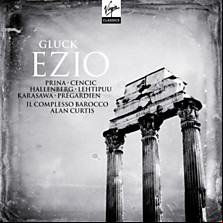BBC Review 1bj6o
Showcases its singers’ virtuosic displays – and what a cast this is.
Graham Rogers 2011
Christoph Willibald Gluck is celebrated today as a great reformer of opera. His most famous work, Orfeo ed Euridice, was the first of a clutch of radical operas that took the form in a more naturalistic direction with lasting influence on its future development.
Ezio is not one of those works. Written in 1750 (more than a decade before Orfeo) it is one of many ‘pre-reform’ operas for which Gluck was justly renown in his time, and which are now largely overlooked in favour of his subsequent trailblazers. This is a shame because they contain a wealth of delightful music.
Ezio sticks to the then well-established opera seria model – a series of solo da capo arias which showcase star singers in flamboyant flights of virtuosic display and emotional reflection. As dramatic spectacles, modern audiences would no doubt find these operas unremittingly dull, each aria being merely a vehicle for characters to convey their reaction to the latest plot development by stepping out of the ‘action’ – which only advances in continuo-accompanied recitative. That is not a problem with an audio recording, however, which offers a welcome chance to revel in the richness of Gluck’s refined gallant style – especially when the cast is as good as this.
Contralto Sonia Prina is superb in the title role (the General of Caesar’s armies, originally written for a male castrato) – velvety-voiced in her lugubrious aria at the start of Act 1, fiery and intense in the quick-fire "Se fedele mi brama". Fulvia, in love with and loved by Ezio, is sung with ion and sensitivity by contralto Ann Hallenberg. Her final-scene aria, believing Ezio to be dead, is one of the most affecting moments. Undignified though the figure of Emperor Valentiniano III is – he has unwelcome designs on Fulvia himself – it is impossible not to be won over by the sumptuously lyrical countertenor voice of Max Emanuel Cencic. Topi Lehtipuu, Mayuko Karasawa and Julian Pregardien complete the strong line-up of soloists.
Ezio is similar in outline to Handel’s many operas – so it has strong advocates in veteran Handelian Alan Curtis and his Il Complesso Barocco ensemble. They present a committed and nimble , recorded at and after a public performance in in 2008, which makes a highly persuasive case for Gluck’s neglected operas.



